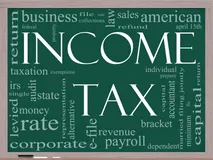Introduction
Income tax is an essential component of a nation’s revenue system, ensuring the provision of public services and government operations. However, in certain circumstances, taxpayers may encounter situations where their expenses and deductions exceed their income, resulting in income tax losses. These losses can have both immediate and long-term implications, influencing an individual’s or business’s financial standing and tax obligations. This article aims to shed light on the concept of income tax losses, exploring their definition, impact, and potential benefits for taxpayers.
Definition of Income Tax Losses
An income tax loss occurs when an individual or business incurs expenses and deductions that surpass their total income for a given tax year. In simpler terms, it means that the taxpayer has experienced a net loss during that specific period. Income tax laws often allow individuals and businesses to carry forward or carry back these losses to offset future taxable income or recoup previously paid taxes. Understanding the rules and regulations surrounding income tax losses is crucial for taxpayers aiming to maximize their tax benefits and minimize their financial burdens.
How Do Income Tax Losses Impact Individuals?
Income tax losses can significantly impact individuals, especially those who are self-employed or have multiple sources of income. Here are some key points to consider:
Tax Liability Reduction:
By utilizing income tax losses, individuals can offset losses against their current or future taxable income. This reduction in tax liability can provide valuable financial relief.
Carryforward:
In some jurisdictions, individuals can carry forward their income tax losses to offset future taxable income for a specific number of years. This provision allows taxpayers to utilize their losses when their financial situation improves, potentially leading to substantial tax savings.
Alternative Income Streams:
Individuals with diverse sources of income, such as rental properties or investments, can leverage income tax losses from one income stream to offset taxable income from another. This strategy can help balance tax obligations and optimize their overall tax position.
How Do Income Tax Losses Impact Businesses?
Businesses can also experience income tax losses due to various factors, including economic downturns or significant investment costs. The implications of income tax losses for businesses are as follows:
Tax Planning Opportunities:
Proper management of income tax losses enables businesses to strategize their tax planning effectively. By utilizing losses, businesses can offset taxable income in profitable years, reducing their tax burden and preserving cash flow.
Carryback and Carryforward:
Many jurisdictions allow businesses to carry back income tax losses to offset taxable income from previous years. This provision can provide immediate relief by potentially obtaining refunds for taxes previously paid.
Investment Incentives:
Income tax losses can act as incentives for businesses to invest in research and development, expansion, or other growth-oriented activities. The ability to offset losses against future taxable income encourages innovation and business development.
Utilizing Income Tax Losses: Tips and Strategies
To make the most of income tax losses, taxpayers should be aware of key strategies and considerations. Here are some valuable tips:
Effective Utilization of Income Tax Losses
Accurate Record-Keeping:
Maintaining thorough and accurate financial records is crucial to substantiate income tax losses. Documentation of expenses, deductions, and income sources will provide support during tax assessments and audits.
Tax Professional Guidance:
Consulting with a tax professional or accountant well-versed in tax laws and regulations can help individuals and businesses optimize their tax positions. They can provide tailored advice based on specific circumstances and help navigate complex tax rules.
Planning and Forecasting:
By projecting future income and expenses, individuals and businesses can plan ahead and strategize the utilization of income tax losses effectively. Timely planning allows for optimal tax benefits and ensures compliance with relevant regulations.
FAQs about what are income tax losses.
Q1: Can individuals carry forward income tax losses indefinitely?
No, the ability to carry forward income tax losses is usually subject to certain limitations set by tax authorities. In most jurisdictions, there is a specified number of years within which losses can be carried forward.
Q2: Are income tax losses applicable only to businesses or self-employed individuals?
No, income tax losses can be incurred by both businesses and individuals, depending on their financial circumstances and deductions exceeding income.
Q3: Can income tax losses be claimed retroactively?
In some jurisdictions, businesses may be allowed to carry back income tax losses to offset taxable income from previous years, leading to potential tax refunds. However, retroactive claims for individuals are less common.
Conclusion
Understanding income tax losses is crucial for individuals and businesses aiming to optimize their tax positions and reduce financial burdens. By utilizing income tax losses effectively, taxpayers can offset losses against taxable income, potentially leading to substantial tax savings. It is essential to stay informed about applicable regulations, consult with tax professionals, and engage in proactive tax planning to make the most of income tax losses. By doing so, taxpayers can navigate the complexities of the tax system and ensure compliance while maximizing their financial benefits.







